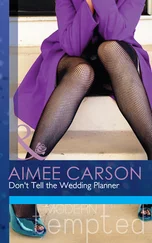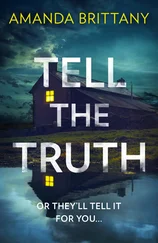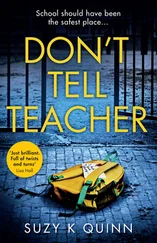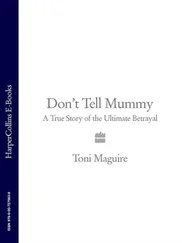As I walked home, I thought about our conversation. I couldn’t control that the Nazis considered me a subhuman. But what I could control was how I treated others.
Only one good thing was happening. The identity papers that Uncle Ivan and Mr. Segal had created, transforming Jews into Ukrainians, seemed to be working. As Dolik and I sat on the front step during the warmer evenings, he’d whisper to me the names of those who had escaped. Some went on foot, disappearing into the mountains, while others would trot beside a slow-moving train in the wee hours of the morning and hop on when an open car rolled by. Knowing that the documents worked gave me hope, but it also made me wonder why Dolik didn’t try to leave. I knew for a fact that he and his brother both now possessed forged passports and that Doctor Mina had a false Kennkarte .
“Mami feels that it’s safer for us here right now,” Dolik told me. “The war is all around us, so how could we truly escape? Why jump from the frying pan into the fire? Plus, it’s Mami’s responsibility as a doctor to stay and help.”
Was Doctor Mina right? Maybe our false documents gave nothing more than false hope. I could also understand why she was reluctant to leave her patients. With the brutal work schedules, starvation and violence directed against Jews in particular, she had been kept very busy.
But deep in my heart, I felt that the false documents could make a difference. I continued to take Krasa to the pasture twice a day, and continued to transfer the photos and documents. Auntie Iryna usually brought the documents herself. She tried to come in the evening so Maria and I could see her in person. Like all of us, she had become thin, but she looked fierce with her hair braided tightly against her head and her blouse tucked into military trousers.
* * *
Since most of our own milk was now confiscated, I could no longer use the ploy of daily milk deliveries to get any new documents to the Segals.
It was Maria who came up with a solution. She took the packet from me and put it in her own pocket. “ I’ll take them. I see Nathan every day when he’s finished work. No one should find that suspicious.”
In addition to delivering the packets to Nathan, my sister also began getting up an hour early each morning to walk along the train tracks, searching for anything useful that might have fallen off the trains during the night. Mostly what she brought back were pieces of coal, but once she found a package of dried fruit that must have been dropped by a person escaping.
My little sister was growing into a very brave person.
Maria also lined up every day for the single piece of bread that our ration cards allowed each of us, but sometimes she’d come home with nothing. On other days, the bread she brought back would smell like something from the outhouse. At least we had a bit of milk and the occasional egg, plus the wild greens and roots that we foraged.
But Dolik’s family had no chickens or cow. The Segals didn’t either. And Jewish ration cards provided even less bread than ours. There was a black market in food — Volksdeutche who worked at the warehouse would steal from there and sell it back to the locals — but the prices were so high that only the wealthiest could afford it.
Each day Dolik’s cheeks seemed to grow hollower — a combination of his starvation diet and the heavy labour he was forced to do.
“You can’t go on this way,” I said to him one evening, as we sat together on his front step. “There has to be a way to get more food.”
“We have a little bit of money saved,” said Dolik. “But we can’t afford much when we buy food from the Volksdeutche.”
“What about buying it from farmers in the outlying areas who might have been able to hide some produce?”
“There’s no way to get in touch with them,” he said. “This arm band is a red flag to the Nazis. They watch our every movement.”
“Maybe I can figure something out.”
After that conversation, I visited Auntie Polina and told her of the problem.
“We don’t have much food either,” she said. “The Nazis were thorough. But I’ll see what I can do.”
Auntie Polina set up a network of trusted farmers in the area, and between them they sold her the meagre bits of food that they could spare — a bit of hard cheese from this one, sometimes a potato or two from that one, or a carrot from someone else. Then she’d meet me at the pasture. I paid her with money from the Segals and the Kitais. I also bought food for ourselves with the money we earned working at the Commandant’s, and while this was a cheaper method than buying on the black market, the money still didn’t go very far.
“I wish I could just give this food to you instead of having to make you pay,” said Auntie Polina. “But the farmers need to buy seed to replace what was confiscated, or there will be no crops next year. And they have to repair the buildings and replace the tools that were stolen or destroyed by the armies.”
“I know, Auntie,” I told her. “I appreciate all that you’re managing to do.” What I didn’t say is that I feared all of us would either starve or be killed if things continued as they were.
When I walked home that morning with a pocket of false documents plus three potatoes in my blouse, I witnessed a man being beaten by the police for having potatoes.
“If I find out you were giving these to Jews, I’ll come back and shoot you,” said the policeman as he hovered over the cowering man.
I silently stepped past them, head down and heart pounding. Would the policemen catch me next?
Once I got home and tethered Krasa, I collapsed into the corner of the shed and wept. What kind of person was I becoming that I could walk past a man being beaten and terrorized and only be glad that it wasn’t me? I took the documents out of my pocket and looked at each solemn face staring back at me. I hoped and prayed that my small acts of rebellion would make a difference, that some of these people would escape and that my neighbours wouldn’t starve. I took the potatoes out of my blouse and left one of them hidden behind a tin on the shelf. That would be our supper tonight. I would have to find the ideal time to sneak the second potato to Dolik. Maria would give the third to Nathan.
I climbed up to the loft and looked through what we had stored there. Maybe I could find something to barter for food. Auntie Iryna’s plates and kitchen things were up there, but they were plain and worn and only of sentimental value. We had some jars of jam and pickles that we were saving for when Krasa’s milk went dry in the winter. And then I remembered the box Auntie Stefa had sent us from Toronto before the war. Had she sent something valuable to barter with? I brushed the straw off the top of the box and lifted the flaps.
An opened envelope addressed to Mama sat on top. When I pulled out the folded letter, a photograph fell out. It was a picture of Auntie Stefa, grinning, wearing a big coat with a fur-trimmed collar and standing on the steps of a modern building. She looked like Mama, except happy and well fed. I unfolded the letter and read:
Kataryna —
Eaton’s had these in their bargain bin and I couldn’t resist, so I bought the whole lot. Hope they’re useful. But why don’t you just come to Canada? I would be happy to sponsor you and your girls. There are plenty of jobs here for single women, plus Krystia and Maria would get the education they deserve! Think about it, won’t you, sweet pea?
Love, your big sister Stefa
I folded the letter around the photo and put them both back in the envelope. What would our life be like now if we lived in Canada instead of Viteretz? We’d have enough to eat, and there would be no war happening all around us. And maybe I’d get a big coat to wear. It sounded almost like heaven. But Viteretz was home, and Tato was buried in the cemetery across the road. Even so, part of me wished we were all safe with Auntie Stefa and far away from the Commandant and his Nazis. If only I could snap my fingers and make it happen.
Читать дальше
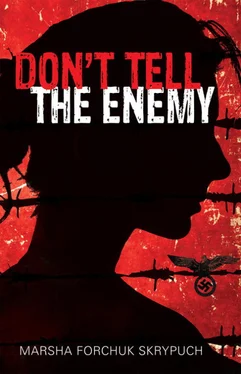

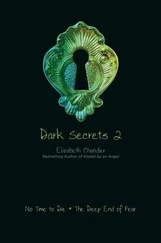
![Quiet Billie - Don't mistake the enemy [СИ]](/books/421973/quiet-billie-don-t-mistake-the-enemy-si-thumb.webp)




